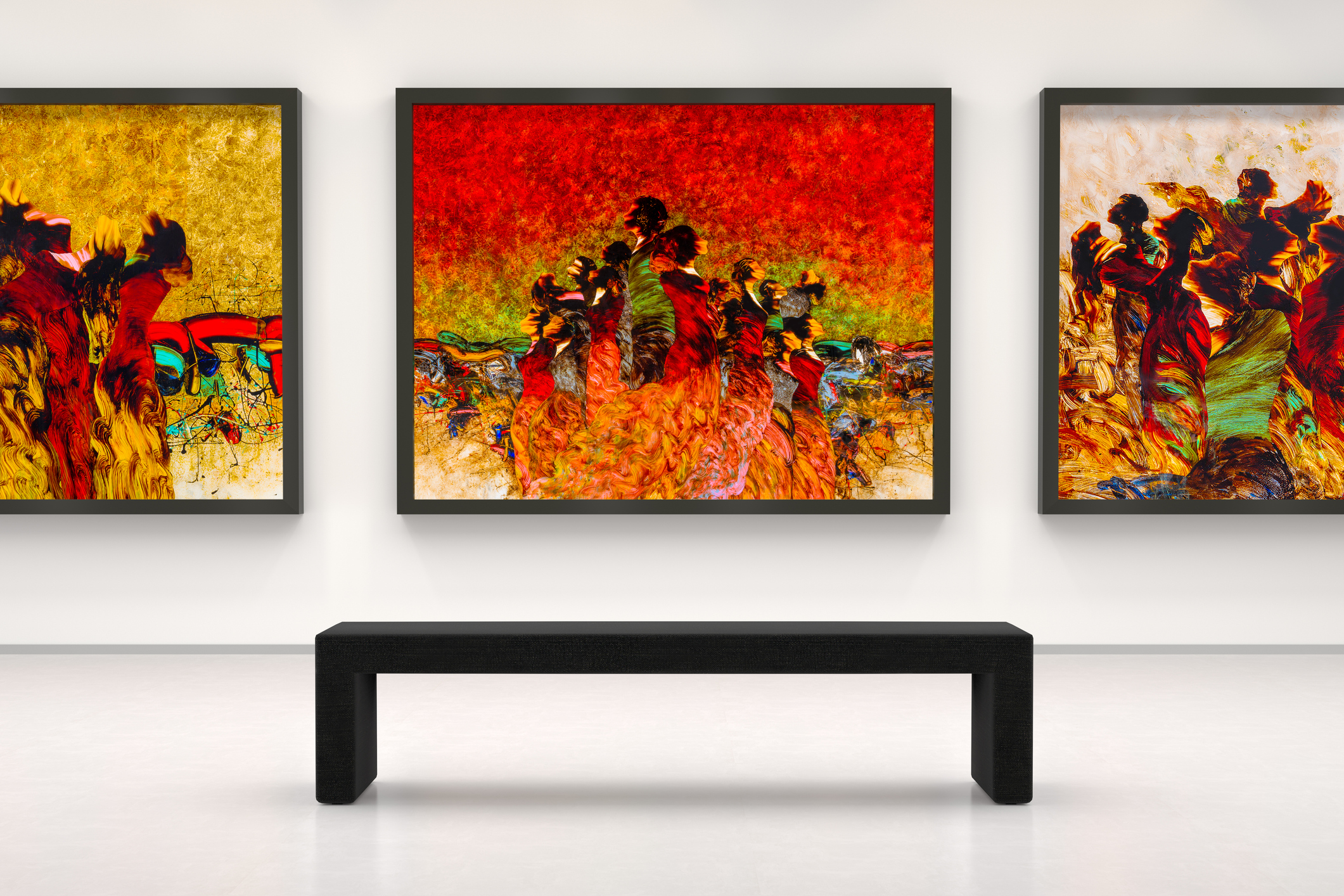Should you invest in art collectables?
If you want to invest in art collectables, buy the work of fledgling artists before their careers take off, says Sarah Ryan of New Blood Art


Get the latest financial news, insights and expert analysis from our award-winning MoneyWeek team, to help you understand what really matters when it comes to your finances.
You are now subscribed
Your newsletter sign-up was successful
Want to add more newsletters?

Twice daily
MoneyWeek
Get the latest financial news, insights and expert analysis from our award-winning MoneyWeek team, to help you understand what really matters when it comes to your finances.

Four times a week
Look After My Bills
Sign up to our free money-saving newsletter, filled with the latest news and expert advice to help you find the best tips and deals for managing your bills. Start saving today!
We collect art for all sorts of reasons – and seemingly for no reason at all. There was no reasonable justification for me spending my entire first month’s modest teaching salary on a painting by an unknown Serbian artist, but I’m glad I did. Not because it’s gone up in value, but because I love it.
It reminds me who I am, who I was and what I value in life. Art collections evolve over time and can serve as deeply personal and meaningful reflections of a collector’s life. Art can also be an investment.
Am I sorry I didn’t buy a canvas by an almost unknown “sort of street artist” (called Banksy) when I was advised to while on a skiing trip in 2004? Yes, I am. My love of art and the fact it’s possible and pleasing to see significant gains from it are separate.
MoneyWeek
Subscribe to MoneyWeek today and get your first six magazine issues absolutely FREE

Sign up to Money Morning
Don't miss the latest investment and personal finances news, market analysis, plus money-saving tips with our free twice-daily newsletter
Don't miss the latest investment and personal finances news, market analysis, plus money-saving tips with our free twice-daily newsletter
Viewing art solely as an investment is frowned upon in some circles and it is an interesting (and controversial) topic to unpack. Art as a commodity can seem to undermine its intrinsic value and overshadow the artistic, cultural and creative aspects of the work.
Additionally, focusing on the investment potential can and does lead to speculative (and unsustainable) bubbles and the inflation of prices arguably beyond the artistic merit of the work, which is unhelpful, certainly for the artist in the long term. (Though isn’t this the case in all markets?)
Perhaps the key difference is that there is an individual here, in the emerging art market at least, who is being valued (or not), commodified, invested in or sold. That particularly stings as art is so intrinsically connected to the very being of the artist who made it – unlike other alternative investments, such as a luxury watch, for example, or a fine wine, which can be objectified without fear of exploitation.
Is it profitable to invest in art collectables?
What if art were immune to these influences? Then there would be no art market and how then would artists survive, outside of charity and philanthropy? And what about the artists starting out?
Life as an emerging artist is an insecure life choice and this is where my mission with New Blood Art began 20 years ago. It is very difficult for emerging artists to make a viable living from their work, though the market has changed radically over the last two decades.
It used to be an artist could hardly sell work outside of friends and family without the structure of a gallery set-up, and artists do still face challenges in reaching potential buyers, establishing credibility and showcasing their work to a wider audience without a gallery behind them. That said, there are far more opportunities now, and with the rise of online platforms and particularly social media, artists are increasingly finding alternative ways to market and sell their work directly to collectors. I think these opportunities will only increase over the coming years and big disruptions could be on the horizon.
The art market could look quite different in a few years. “While the art market contracted over the last year, total online sales in 2023 were almost triple pre-pandemic levels, and more works sold online last year than ever before (including during lockdown),” says Artnet in its latest intelligence report from March. “This suggests that both buyer and seller behaviour around transacting virtually has changed for good.”
There are benefits to investing in fledgling artists at degree show level. You only play the upside – their work will never be priced lower and if their career takes off, then the value of their early works can increase significantly. There’s an appeal for early works. They can be more emotionally raw and relatable.
For a collector, there is also a sense of having been “in on the ground floor” with an artist’s early works, which can make pieces feel more special – to have discovered an artist before they became more mainstream.
Prize-winning emerging artists
At New Blood Art, we now work in collaboration with universities and art colleges, inviting art department heads and art tutors to nominate their most talented, committed and innovative artists each year for the Emerging Art Prize. This marks a new evolution in curatorial technique, inviting greater input from tutors, heads of departments and art colleges to nominate emerging artists.
Tutors and lecturers from art colleges and universities are invited to nominate outstanding graduating artists from their fine art degree programmes. You will find at newbloodart.com a list of 2024 graduating artists who have been nominated by their university art departments for this year’s prize. Many of the artists we first platformed following their degree shows are now 20 years older and in mid-career.
These artists are making a living from their art, and you will find them situated in our Masters section. We have numerous examples of artists whose work you could have bought in the low hundreds when they first arrived with us after their degree shows and who now would sell for ten or 20 times that amount.
This year, we showcase some outstanding artists nominated by their tutors, including Christian Sloan, a Northern Irish sculptor graduating from Edinburgh College of Art; Alice Wheeler, a photographer (her work, The Son, is pictured above), also from Edinburgh College of Art; and a wonderful Print Master’s graduate from the Royal College of Art, Sean Pearl.
This article was first published in MoneyWeek's magazine. Enjoy exclusive early access to news, opinion and analysis from our team of financial experts with a MoneyWeek subscription.
Get the latest financial news, insights and expert analysis from our award-winning MoneyWeek team, to help you understand what really matters when it comes to your finances.
Sarah Ryan writes about alternative investments for MoneyWeek. She is the founder and director of New Blood Art, an innovative online gallery for exceptional early-career artists, which helps to make collecting original fine art accessible to more people.
Many of the artists Sarah has featured have gone on to perform exceptionally well commercially, earning her a reputation among fans of alternative investments.
Sarah has a degree in fine art from London Metropolitan University and a PGCE in art education from Cambridge University and previously worked as a teacher.
Sarah also holds a diploma in integrative counselling & psychotherapy from the University of Roehampton, and is a practising psychotherapist.
-
 Should you buy an active ETF?
Should you buy an active ETF?ETFs are often mischaracterised as passive products, but they can be a convenient way to add active management to your portfolio
-
 Power up your pension before 5 April – easy ways to save before the tax year end
Power up your pension before 5 April – easy ways to save before the tax year endWith the end of the tax year looming, pension savers currently have a window to review and maximise what’s going into their retirement funds – we look at how
-
 Three key winners from the AI boom and beyond
Three key winners from the AI boom and beyondJames Harries of the Trojan Global Income Fund picks three promising stocks that transcend the hype of the AI boom
-
 RTX Corporation is a strong player in a growth market
RTX Corporation is a strong player in a growth marketRTX Corporation’s order backlog means investors can look forward to years of rising profits
-
 Profit from MSCI – the backbone of finance
Profit from MSCI – the backbone of financeAs an index provider, MSCI is a key part of the global financial system. Its shares look cheap
-
 'AI is the real deal – it will change our world in more ways than we can imagine'
'AI is the real deal – it will change our world in more ways than we can imagine'Interview Rob Arnott of Research Affiliates talks to Andrew Van Sickle about the AI bubble, the impact of tariffs on inflation and the outlook for gold and China
-
 Should investors join the rush for venture-capital trusts?
Should investors join the rush for venture-capital trusts?Opinion Investors hoping to buy into venture-capital trusts before the end of the tax year may need to move quickly, says David Prosser
-
 Food and drinks giants seek an image makeover – here's what they're doing
Food and drinks giants seek an image makeover – here's what they're doingThe global food and drink industry is having to change pace to retain its famous appeal for defensive investors. Who will be the winners?
-
 Barings Emerging Europe trust bounces back from Russia woes
Barings Emerging Europe trust bounces back from Russia woesBarings Emerging Europe trust has added the Middle East and Africa to its mandate, delivering a strong recovery, says Max King
-
 How a dovish Federal Reserve could affect you
How a dovish Federal Reserve could affect youTrump’s pick for the US Federal Reserve is not so much of a yes-man as his rival, but interest rates will still come down quickly, says Cris Sholto Heaton
